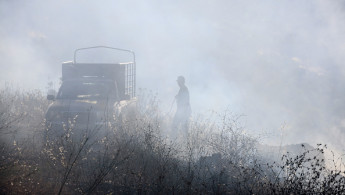Israel says Lebanon offensive plan 'approved' as tensions surge
The Israeli army on Tuesday said plans for an offensive in Lebanon were "approved and validated" amid escalating cross-border violence with Hezbollah and a relative lull in Gaza fighting.
Israel's war on Gaza has heightened tensions across the region, with Israeli forces and Lebanon's Hezbollah exchanging fire on a near-daily basis.
"Operational plans for an offensive in Lebanon were approved and validated" as commanders met for a situational assessment, the army said in a statement.
It came after Israeli Foreign Minister Israel Katz threatened Hezbollah's destruction in a "total war".
The latest warnings came after Israel announced at the weekend a daily "pause" of military activity in Gaza's southernmost city of Rafah to facilitate aid flows, coinciding with the Muslim Eid Al-Adha holiday.
In central Gaza, witnesses reported gunfire and artillery shelling near the Nuseirat refugee camp, where the civil defence agency said at least 13 people were killed in two separate strikes on a family home and a commercial building.
Al-Awda hospital said it received the bodies of "six martyrs and 15 wounded as a result of Israeli airstrikes on various areas in the central and southern Gaza Strip".
Witnesses and the Gaza government media office said there were some strikes and fighting elsewhere in the north and centre of the strip.
In a statement, the Israeli army said its operations continued Tuesday in central and southern Gaza including Rafah city on the border with Egypt.
'Total war'
In a message for Eid Al-Adha, US President Joe Biden has called for the implementation of a ceasefire plan he outlined last month, saying it was "the best way to end the violence".
US envoy Amos Hochstein said the plan would ultimately lead to "the end of the conflict in Gaza" which would in turn quell fighting between Israel and Hezbollah.
But Israel's top diplomat on Tuesday said: "We are very close to the moment when we will decide to change the rules of the game against Hezbollah and Lebanon."
"In a total war, Hezbollah will be destroyed and Lebanon will be hit hard," Katz said in a statement from his ministry.
It came after Hezbollah published a more than nine-minute video showing drone footage purportedly taken by the movement over northern Israel, including parts of the city and port of Haifa.
Biden's proposal would bring an initial six-week pause to fighting and Hamas would free hostages in exchange for the release of Palestinian prisoners held by Israel.
Mounting criticism
Israeli Prime Minister Benjamin Netanyahu is facing mounting criticism at home over his handling of the Gaza war and hostage crisis.
The veteran right-wing leader invited the relatives of killed hostages to his home, several families told AFP on Tuesday.
But one relative, who spoke on condition of anonymity, said she would decline the invitation, saying, "he remembered a little late to invite us".
Thousands gathered in front of parliament on Tuesday evening, calling for early elections and the resumption of negotiations for a hostage release deal, an AFP correspondent said.
"We are held hostage by an extreme-right government and we want this to stop," said Marva, who said she has been demonstrating against Netanyahu for more than a year.
Moshe, a retired journalist, said: "Democracy is at stake."
"We protest to save the country," he said, adding he aimed to "bring down the Knesset", Israel's legislature.
It marked the second day amid a week of planned action in Jerusalem against Netanyahu and his government.
The eastern sector of Jerusalem is occupied Palestinian territory.
'Death and suffering'
In Rafah, where the Israeli military has said it would pause fighting along a key route in the city's east, witnesses saw Israeli military vehicles and reported shelling in other areas.
Israel's war on Gaza has killed more than 37,000 people in Gaza, according to the territory's health ministry.
The Hamas-led 7 October attack by Palestinian militants on southern Israel resulted in the deaths of 1,194 people, according to an AFP tally based on Israeli official figures.
There were also 251 captives seized. Of these, 116 remain in Gaza, although the army says 41 are dead.
United Nations rights chief Volker Turk said he was "appalled by the disregard for international human rights" and "unconscionable death and suffering".
The United Nations has said aid access to Gaza has been severely hindered by factors including insecurity, the closing of crossing points to the territory, and Israeli procedural delays.
Since the start of Israeli military operations around Rafah in early May, when the vital crossing was seized and closed, "aid delivery and humanitarian access deteriorated further", Turk said.
Hamas demanded the opening of the Karm Abu Salem (Kerem Shalom) and Rafah crossings and accused Israel and its close ally the United States of the "crime of preventing the entry of aid and food as a tool for political pressure".
Displaced Palestinian Ali Hassan, sheltering in a tent in central Gaza's Deir Al-Balah, said "Eid Al-Adha this year is not like previous holidays."
"There is no meat or sacrificial animals, we don't even have clothes for the children," he told AFP.





 Follow the Middle East's top stories in English at The New Arab on Google News
Follow the Middle East's top stories in English at The New Arab on Google News


